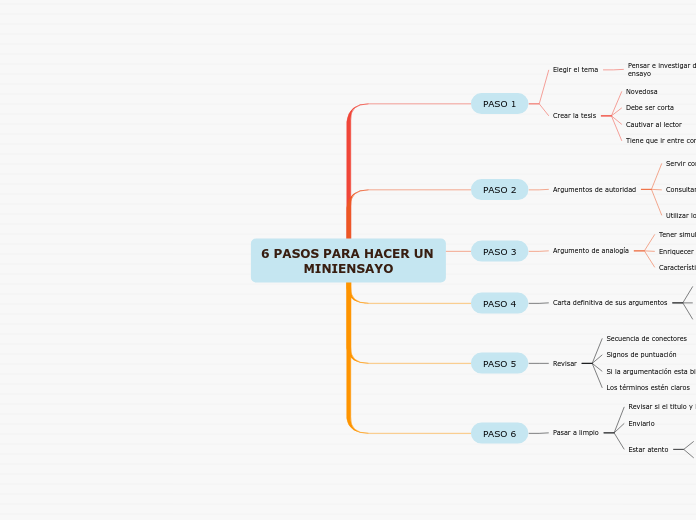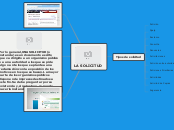6 PASOS PARA HACER UN MINIENSAYO
To name your story, you have to think about the overall message and what you want your audience to understand from the story. Also, make it relevant and easy to remember.
PASO 6
Pasar a limpio
Estar atento
Sugerencias
Correcciones
Enviarlo
Revisar si el titulo y la tesis están en sintonía
PASO 5
Revisar
Los términos estén claros
Si la argumentación esta bien
Signos de puntuación
Secuencia de conectores
PASO 4
Carta definitiva de sus argumentos
Dar aportes
Subrayar lo importante
No resumir lo escrito en el ensayo
PASO 3
The ending of a story is essential. We all know that if the ending is weak, what happened before loses its importance. So make it unpredictable, but fair. A resolved ending answers all the questions and ties up any loose threads from the plot.
Argumento de analogía
This is the moment when the main character surpasses the last obstacle and finally faces their greatest challenge.
The climax usually follows one of these patterns:
- realization
- resolution
- choice
Type in your answer.
Características relevantes
Enriquecer el sistema de semejanzas
Otra realidad el lector
Subtopic
Tener simulitud con la tesis
PASO 2
The middle of the story is where you add layers of complications that will lead to the end. Reveal more about the character's journey. Did their personality go through changes? How did they overcome the challenges? And as you build up the story’s central conflict, make it more personal to that character. Also, from the middle act, you have to lead into the final act.
Argumentos de autoridad
Each story has a main character and that character usually needs to solve a problem or challenge. The character's challenge is the one that creates tension throughout the story.
Utilizar los conectores lógicos
Consultar fuentes bibliograficas
Type in any other challenges which other characters in the story need to face.
Citas
Conectarlas al texto
No deben ser tan largas
Servir como soporte de la tesis
In most stories, there are 3 challenges. The number 3 is a mystical number symbolizing completeness. Try to come up with interesting challenges with which your character needs to struggle.
See a few examples below:
- turns into a werewolf at night
- is sent back in time
PASO 1
In the beginning of the story (or the exposition), you will need to introduce the setting and characters. You might also want to introduce the main conflict. This part of the story is important because it gives the reader necessary background information and maybe even a first insight into a character’s personality.
Crear la tesis
The setting (time & place) of a story can change throughout the plot.
Tiene que ir entre comillas
Sensory details include sight, sound, touch, smell, and taste. These details are important because they create depth in your setting.
See a few examples below:
- the smell of fresh bread
- the scent of freshly cut grass
- rain falling onto the windshield etc.
Cautivar al lector
The weather is an important element in your story because it can highly influence the ambiance and the mood of the characters.
Debe ser corta
The time of the story can also change. It can describe the event of a single day or can include an entire year's plot. Anyway, don't forget to mention it.
Novedosa
Your story can take place wherever your imagination will take you to.
For example: in an elevator, in an enchanted forest, etc. Don't forget to give details of the environment each time the setting changes, otherwise, the story can be confusing. Also, mention the seasons as each of them has unique weather and events.
Elegir el tema
Characters are essential to a good story. Usually, the protagonist(s) is/are the most affected by the plot. Introduce a character by focusing on their actions, interests, and occupation, as the physical appearance doesn't make a difference in most cases.
Pensar e investigar de lo que se quiere hablar en el ensayo
Type in the name of your character.










